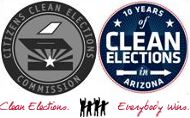3/10/2009
Photo Tickets Pad Campaign Coffers of Arizona PoliticiansArizona politicians have collected $36,265,795 in campaign cash from a tax on speeding tickets since 1999.

A tax levied on speeding tickets funds the re-election efforts of two-thirds of Arizona's politicians and provides lawmakers with a personal financial incentive to protect controversial photo enforcement programs. In 1999, a ten percent surcharge was imposed on all traffic tickets to create the "Citizens Clean Election Fund." The fund allows politicians to avoid tedious fundraising efforts.
After raising just $5 each from 220 people in a district, candidates for public office qualify for public financing money to match private expenditures. In effect, these lawmakers collect $16.50 for their campaigns each time a photo radar ticket is issued on an Arizona freeway.
This adds up to big money. In 2008, traffic tickets generated $10,095,771 in revenue for the clean elections fund. Out of this amount, $7,710,739 million was disbursed to lawmakers and candidates during the primary and general elections -- an average of $72,063 each. In just the past four months, the new freeway speed camera program has already added another $3.3 million to the total amount collected for lawmakers. Over the past four election cycles, Arizona politicians collected a total of $36,265,795 in campaign cash from the tax on speeding tickets. Opponents of the state photo ticketing program are crying foul.
"Photo radar pays for politicians to get elected," Shawn Dow, a volunteer for the activist group CameraFraud.com, told TheNewspaper. "Voters want the cameras gone but the politicians want them to stay since it pays for their election. This is the reason that the people believe our government is corrupt."
Dow raised the election funding issue before the state House Transportation and Infrastructure Committee last Thursday while testifying against House Bill 2170. This legislation is portrayed as a repeal of former Governor Janet Napolitano's freeway photo program, but the text of the proposal actually allows freeway photo ticketing to continue against truckers and other holders of commercial vehicle licenses.
Some of the biggest supporters of photo radar are recipients of significant ticket funding.
"Photo-radar tickets aren't issued," state Senator Rebecca Rios (D-Apache Junction) told the Arizona Republic in February 2008. "They're earned."
Rios herself earned $35,634 in campaign funds from speeding tickets last year. Other legislators appear less supportive of photo radar by introducing legislation that make minor modifications to the way programs are run. State Representative John Kavanagh (R-Fountain Hills), for example, introduced House Bill 2722 last year which would have mandated that the profits from any local jurisdiction's use of a speed camera on a state highway be directed into the Arizona Highway Patrol Fund so that it could be used to fund additional traffic ticketing details. Kavanagh has taken $156,654 in campaign funding from speeding tickets.
The clean elections fund does have other sources of revenue besides traffic tickets. A $5 check-off on income tax forms generated about $6 million which was spent on "voter education" efforts directed by the Citizens Clean Elections Commission. Money left over in the fund from the off-years without elections goes into the general fund.


